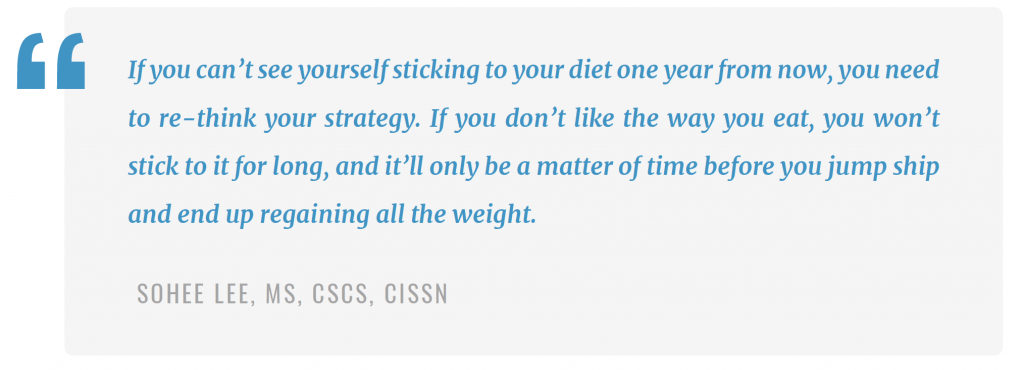
YOUR FITNESS BLOG
Your Successful Diet: How To Keep The Weight Off
Introduction
The term diet brings about many different interpretations, feelings and associations. Those who diet typically associate the term with weight loss, food restriction, anxiety, and popular diets like low carbohydrate, low fat, vegan or a ketogenic diet. The problem with the team “diet” is it is associated with a start and end point [1]. A start of a diet indicates the initiation of caloric restriction, and the end associated with a return back to “normal” eating [1]. This focus is clearly on a short-term result, rather than long-term sustainability. A diet, regardless of the named type, can certainly be effective for weight reduction. The research shows that six out of seven people successfully use dieting to lose weight [1]. The problem is that within three years of weight loss, approximately 95% of individuals will have regained all of the weight back [1]. With the success rate of diets being only about 5%, the problem then is not the weight loss, but rather the longer-term strategies, or behaviours, that individuals utilise to keep the weight off. This article will look into three behavioural strategies successful dieters apply to ensure the weight stays off: self-monitoring, structure and flexible eating, and long-term thinking.
Self-Monitoring
Self-monitoring is the recording of the performance of a particular behaviour such as food intake, physical activity, or general movement [2]. Even self-weighing is considered a form of self-monitoring [2]. Self-monitoring is critical to the process of determining one’s progress towards a particular goal. It brings about deliberate attention to an individuals behaviours and in recording one’s actions, self-mentoring provides the opportunity to not only evaluate progress, but modify the specific behaviour if required [2]. For example, if an individual records their food intake each day of their diet, he or she can easily determine whether their food intake is aligned with the deficit required for desired weight loss. Furthermore, by placing deliberate attention on the behaviour of food intake, that individual can better modify their behaviour (i.e. regulate alcohol intake) to ensure the behaviour stays in line with their goal [2].
The literature shows that individuals successful at maintaining weight loss over the long-term (i.e. at least one year), make heavy use of self-monitoring practices. In a paper by Hindle and Carpenter (2011), the authors interviewed 10 female subjects who had lost 10% of their weight and kept it off for at least one year (i.e. weight maintainers) [4]. Among other interview questions, the subjects were asked “What do you think is different about how you have approached controlling your weight compared to others who have not had your success?” [4] In response to this question, all subjects reported using self-monitoring practices, including regular bodyweight weighing, activity tracking and using diet records for food intake [4]. Subjects reported that these self-monitoring strategies enabled quick identification of any changes in all areas influencing weight loss and self-monitoring gave subjects the feeling of ownership and self-control over their weight [4].
Recording daily food and drink intake can bring about feelings of anxiety. Often, bringing poor habits to the surface can be feel uneasy as most adopt an “out of sight, out of mind” mentality [1]. However, measuring food intake should be viewed as a self-regulation habit that allows for more control and mental engagement in the process of weight loss and management [1]. Similarly, bodyweight weighing, should deviate away from individual readings to assess from an average reading over multiple (i.e. three or four) days to account for daily fluctuations [1]. This approach helps to minimise feelings of poor self-image and neuroticism over bodyweight [1].
Diet Structure And Flexibility
Anyone who has worked with a personal trainer or coach, have probably benefited from some degree of structure. This can take the form of a diet plan, workout program, sleep schedule, or general movement strategy. In the context of weight loss, research shows that successful dieters utilise structure in their eating to provide direction, reduce deviation, and build confidence in their eating [3, 7]. This would explain why commercial diet programs, such as Weight Watchers have become popular over the years [3, 7]. Weight Watchers, and other diet programs, have been shown, at least in the short-term (up to 6 months), to generate superior weight loss compared to control, behavioural counselling, or educational intervention [3, 7]. It is likely that structured nutrition eliminates the guesswork in meals giving people confidence in knowing that their eating aligns with their weight loss goals.
A recent study by Kruschitz and colleagues (2017) investigated the effects of a structured diet program on overweight and obese (body mass index >25) individuals [7]. In their study, the authors randomly sampled 70 male and female subjects and enrolled them in a standardised, meal replacement weight loss program for at least 24 weeks [7]. The program placed subjects on a very low calorie diet for 2 days, followed by a meal-replacement, energy-reduced diet for at least 10 weeks [7]. Following the 10 weeks, subjects were to maintain their weight without using meal replacements [7]. Behaviour therapy was also provided to subjects in the form of nutrition and activity tracking [7]. Results of this study showed a significant reduction in body weight and body fat among those who participated in the weight loss program [7]. From baseline to 12-months, 61% of subjects achieved between 5-15% weight loss from their initial starting weight [7]. However, it is relevant to note that subjects started to regain body weight and fat mass following 12 months, which questions the longer-term effects of structured weight loss programs [7].

For longer-term weight loss, a flexible approach to nutrition is found to be a key feature utilised by weight maintainers. Where rigid eating is characterised by an “all or nothing” approach, flexible eating is a more graduated approach that moves away from a diet mentality to adopt a more flexible one [4, 5]. Within a flexible approach, there are no restricted foods, only parameters of calories and macronutrients (i.e. protein, fats, carbohydrates) [1]. Studies have shown that successful weight maintainers allow themselves to have the odd “treat” and avoid banning foods to eliminate feelings of deprivation and improve nutritional adherence [4]. A study by Stewart and colleagues (2002) showed that individuals who adopted a flexible approach to eating were less likely to report symptoms of eating disorders, including lower mood disturbances and anxiety [5]. Also, compared to individuals that used rigid control in eating, lower body mass indexes were found among individuals that applied a flexible approach [5].
Think Long-Term
A common feature among individuals who achieved success in weight management is their mentality to view weight loss as a life-long venture not short-term fix [4]. Individuals describe their approach as being more of a way of life, rather than just a diet [4]. The mindset of successful weight maintainers is that their behaviours (i.e. increasing activity) would be practices they would keep forever [4]. In support, studies have found that successful dieters take long-term information into account when making decision, rather than relying on recent outcomes for information. In other words, successful dieters make decisions based on long-term outcomes, as opposed to short-term, immediate outcomes [6]. For example, a unsuccessful dieter would give in to the pleasure of eating, whereas a successful dieter would exhibit self-control over eating purely for pleasure because of the potential for this behaviour to results in future disease or weight gain.
A 2015 study by Koritzky and colleagues examined the differences in decision making between successful and unsuccessful dieters [6]. The authors recruited adults, primarily female (81% female), and enrolled them in a 16-week weight management program [6]. The subjects consisted of both successful and unsuccessful dieters, where successful weight loss was defined by losing at least 5% of one’s initial weight [6]. Subjects were asked to complete decision-making tasks at the beginning of the weight loss program followed by questionnaires [6]. Results of this study showed that compared to unsuccessful dieters, successful dieters had a greater tendency to use long-term information in decision making [6]. Individuals successful at weight loss tended to think about the long-term impact of one’s actions [6]. In the context of eating, these individuals would tend to adopt healthier eating habits rather than eat for satisfaction because they consider the long-term risks associated with poor eating habits [6]. This process of more effortful, long-term thinking may better facilitate the modification of habits and results in sustainable weight loss.
It is very common among dieters that struggle to lose weight and yo-yo diet to adopt short-term strategies [1]. These individuals are more focused on losing maximal weight without any consideration to longer-term consequences. In contrast, successful weight loss individuals do not typically engage in fad diets, but instead focus on gradual, sustained weight loss [1]. Even goal setting among successful dieters is long-term with emphasis on consistent, sustainable behaviours such as regular exercise, controlled eating, and increased general movement.
Summary
With only 5% of diets being successful, attention should be placed on the strategies the small percentage of successful weight maintainers utilise to sustain weight loss long-term. The literature demonstrates that weight maintainers apply heavy use of self-monitoring practices, including recording daily food intake, tracking activity and self-weighing. Also, they use structure in their diet to provide stability and eliminate the guesswork in eating. Even within a structured approach, successful weight maintainers use flexibility in their eating, allowing themselves to have any food within their caloric and macronutrient parameters and using self-monitoring to ensure they stay on track. Finally, individuals who are successful at weight management think long-term. They make decisions based on long-term outcomes and use this information to control their actions, such as not over consuming high-calorie dense foods as they would results in future weight gain. These strategies or behaviours are consistently shown in the research to be utilised by successful dieters and should be heavily considered in one’s weight loss journey for long-term success.
For more information on our personal training services please click here to read more.
References:
[1] Baker, P. and Norton, P. 2019. Fat Loss Forever. Characteristics of Successful Dieters. pp. 77-85.
[2] Burke et al. 2010. Self-Monitoring in Weight Loss: A Systematic Review of the Literature. January. Vo. 111, No. 1, pp.92-102. Journal of American Dietetics Association.
[3] Gudzane, K. et al. 2015. Efficacy of Commercial Weight Loss Programs: An Updated Systematic Review. April. Vol. 162, No. 7, pp. 501-512. Annals of Internal Medicine.
[4] Hindle, L. and C. Carpenter. 2011. An Exploration of the Experiences and Perceptions of People Who Have Maintained Weight Loss. August. Vol. 24, No. 4, pp. 342-350. Journal of Human Nutrition Dietetics.
[5] Stewart, T. et al. 2002. Rigid vs Flexible Dieting: Association with Eating Disorder Symptoms in Non-Obese Women. Vol. 38, pp. 39-44. Appetite.
[6] Koritzky, G. et al. 2015. The Biggest Loser Thinks Long-Term: Recency as a Predictor of Success in Weight Management. December. Vol. 6, pp. 1864. Frontiers in Psychology.
[7] Kruschitz, R. et al. 2017. Long-Term Weight-Loss Maintenance by a Meal Replacement Based Weight Management Program in Primary Care. April. Vol. 10, No. 2, pp. 76-84. Obesity Facts.

Did you find this content valuable?
Add yourself to our community to be notified of future content.

